![]()
The Words of the Thompson Family
|
|
The Words of the Thompson Family |
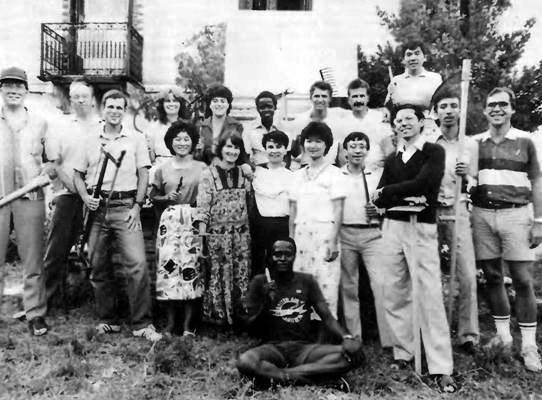
All
the brothers and sisters at the workshop pose with their garden
tools.
It would be difficult to conceive of a lovelier place than Pelion, a bit of heaven on the shores of the blue-green Aegean Sea. Lush and lofty mountains trail their emerald skirts in the waves. High atop one of these mountainsides rests the tranquil village of Tsangarada, amid forests and orchards of fruit trees. It teems with life -- birds, insects, flowers, berries, and the vast shades of ancient chestnut trees. There is beauty everywhere, and above all, peace. It was here, in the spacious old summer house of a good friend of the Greek family, that we met together for the first Middle East regional 21-day workshop.
In the two preceding years our region has held seven-day workshops in Greece: once in Athens in 1984, and last year at this same house in Pelion. But this year Thomas Cromwell, our regional director, felt that he wanted to go beyond the limitations of the seven-day format and give everyone the opportunity for a deeper experience with God. Thomas has been here in the region longer than most of the other missionaries, having first come to Egypt in 1975. He feels God's heart for the region and the members acutely. By his own testimony, even he didn't know exactly what form our workshop would finally take, but he felt called to bring us together, and all of us who attended felt Heavenly Father working through him. So it was truly with a pilgrim's heart that we assembled there, not quite knowing what to expect but somehow feeling we were coming to meet with God.
A very warm atmosphere was created, arising largely from our common experience here in the Middle East and the personal relationship we all have with our central figure. This close bond has contributed to the success of not only our internal workshops, but also the two Introductory Seminars on the Unification Movement (ISUMs) we recently organized on a local level. The previously established personal relationships and the shared insights and experiences between staff and participants has always helped create a special unity and receptiveness.
If the purpose of a 21- or 40-day training is to give new members a more concrete sense of our movement as a whole amidst a universal sampling of brothers and sisters, then perhaps it is effective for them to attend a workshop in America or Europe. But for older native members and missionaries, that can be an artificial environment with limited relevance to the spiritual and material problems they face in their day-to-day life of faith. For older members, the purpose of a 21-day training should be renewal. A workshop must be a spiritual retreat, but not an escape. We must be able to step back for a certain time, removing ourselves from the intensity of battle in order to see the nation and region from a different angle and gain fresh insights into God's perspective. We need to revive the understanding that Heavenly Father really is there, really does care, and does have a vision and a plan for each culture, each religion, each nation, and, most importantly, each member. If we can touch God substantially on the soil of our own native or adopted homeland, we can gain energy for months or years to come.
The Middle East is a very special place to work. Almost all the events in the Bible took place within our region. Virtually every country has had a role to play in providential history. The three great monotheistic religions -- Judaism, Christianity, and Islam -- were all born and promulgated here, and the turbulence of their interaction is the drama of providence.
However, in no way is this history confined to monuments and relics of the past; it is a continuum. The tensions, struggles, warfare, and resentments that sprang up around Jesus' time are alive and even multiplying today. The dynamics of religious, racial, and national fervor still shape the psyches and the souls of the people here. No event, no behavior, can be seen as separate from even as far back as remotest antiquity. There are many thousands of years of spirit world surrounding us, beginning with Adam and Eve themselves; in fact, if the biblical account is accurate, the Garden of Eden lay somewhere along the Turkey-Iraq border.
Each culture that makes up the Middle East has a proud and rich history of its own. The sense of this burns in each heart. Instead of bringing the cultures together, this pride tends to drive a wedge of jealousy between them. The tragedies of fratricide happening today between Iran and Iraq, between Israel and her Arab brothers, within Lebanon, and between Greece and Turkey are all manifestations of age-old rivalries.
The spiritual barriers surrounding people here are often thick and heavy. It is easy for us to make acquaintances on the surface; but it takes months or even years to raise a single spiritual child. Layers upon layers of ancestral influence are difficult to penetrate. Just at the moment when you think you are about to break through, you see that veil fall once again. All of us have known this frustration time after time. We may look back at five or even 10 years of effort and, seeing but little fruit, experience feelings that border on futility.
Yet in spite of this, in almost every country in our region today there are at least two or three native members; in some cases, like Iran, there are many more. Each of these children has such precious value when you consider the years and tears that went into the search for him. This desperate searching extends far beyond the brief span of Unification Church missionary history. It is no exaggeration to say that these spiritual children are the very "chosen people" that Heavenly Father has been longingly seeking out since the time of Genesis. What wonderful ancestors each child must have had for him to be able to penetrate all the barriers and receive the True Parents!
For Western brothers and sisters who have inherited the spiritual openness brought by the Reformation, it may be hard to grasp just how difficult it is for members to join here or how much indemnity and spiritual battle it often requires. The family and the people belonging to a new member's ethnic or religious group may see his conversion as a betrayal. Particularly in a country like Lebanon, a new member is abandoning whatever security he may have had in his community. It can be extremely difficult for a Muslim to feel at home in our centers. He may believe in True Parents and the Principle completely, yet his ancestry will not give him peace to harmonize in detail with the Unification lifestyle.
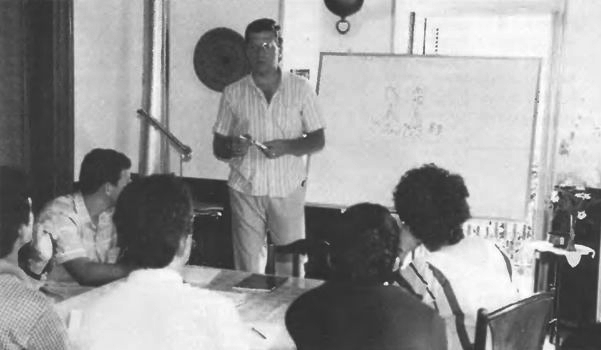
Muhammad
Yahya Thompson gives a lecture.
And so we came, all of us desiring in our deepest hearts to make an offering to God, however small and symbolic, to represent the restoration of and victory over all these historical influences. Somehow on that mountainside in Pelion, we wanted to create the ideal of unity of heart that God has been seeking in the Holy Land for 6,000 years. We were Arab and Israeli, Turk and Greek, Christian, Muslim, and Jew. Most of the cultures of the world have at some time crossed paths in the Middle East, and representing this influence we also had members from Europe and the Far East and two African brothers from Sudan. The Greek government refused visas to our Iranian brothers and sisters and to all but one from Turkey. This saddened us, but in spite of this we were a good sampling of the various providential ancestries.
It is necessary to see the power of the Principle ideal working within the context of our daily lives. If we can't directly witness the working of God, to call ourselves believers is empty. We all felt we were called to Tsangarada, and I think that most of us had a very direct experience with Heavenly Father, the kind of "skin-touch experience with God" that Rev. Sudo used to say was the objective of training. The greatest achievement is to be able to work together in the Principle, to bring about a collective rejuvenation, and to see ourselves as a family group with genuine bonds of familial heart tying us together in a common vision and destiny. This family feeling was the element that was most enriching in our 21 days together.
Because there was no real way of organizing either fundraising or street witnessing in the area of Tsangarada, the entire workshop program was taken up with lectures and lecture practice, discussion, and internal guidance. The first week was devoted to a classical presentation of the Principle. In addition to the examples traditionally cited from the Bible, we also drew heavily from the Quran and the traditions of Muhammad. An entire lecture was devoted to Muhammad, Islam, and their providential roles as we understand them. The purpose of this was not only to make the Principle easier to relate to for our Muslim participants. Equally important, it was to help our non-Muslim participants understand the fact that Islam did have a major role to play in the central providence, that Muhammad really was a prophet, and that the Quran is a book revealed by God that does support the Bible and the Principle. Interestingly, all the things in the Quran can be proven through the Principle, while Muslims themselves have been trying for centuries to convince people of other faiths of this same truth without much success. This is just another demonstration of the Principle's capacity to unite even what appear to be the most irreconcilable hearts.
Except for our two brothers from Sudan, who had to return to Athens after the first week, all the participants were elder members. Deep aspects of the Principle and our life of • faith were discussed openly, and we could seek out answers to the practical and spiritual questions we had long carried in our hearts.
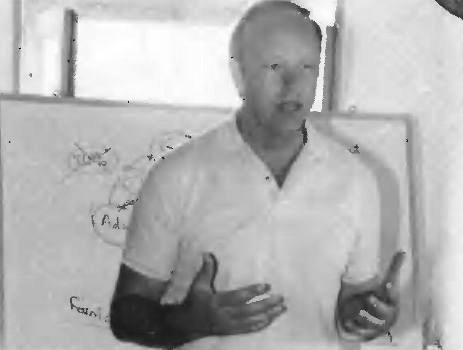
Thomas
Cromwell, lectures Divine Principle.
What made the Principle presentations so special was the internal guidance given by our brother Thomas after each lecture. First he would open the discussion for comments from brothers and sisters, and then he would share his own insights into the content. His primary theme was taking responsibility. Each person is the center of his or her own cosmos, he said and each of us is responsible for restoration within our own sphere. The offerings we make on all levels must always be motivated by the desire to restore that individual and unique cosmos.
The entire collective cosmos needs to be restored, he said, and to accomplish this God founded the True Parents, who have established the Unification movement as a means to fulfill that restoration. Therefore, however small it may be, the Unification movement is very, very important. But the Unification movement is only as powerful as the foundations of its members. Therefore, within the concept of "my cosmos:' we must each feel that this is "my Unification movement" and that we are each taking responsibility for the entire movement.
The essence of membership in the Unification movement is offering, Thomas reminded us. The offering for our foundation of faith is our mission, and to accomplish it we need dogged perseverance. Thomas repeatedly advised us not to let early failure defeat us -- just keep trying, he said. Once we've begun an offering, we must continue until it succeeds. Even if it's small, we should never doubt its seriousness and importance. Sometimes we may be in a position where we can't accomplish a mission at a particular time; circumstances may not be right. But if we have to make a "strategic retreat',' we must do so with the active intent to return to our task when conditions permit. Never accept defeat.
A successful foundation of faith becomes the basis for our foundation of substance. In other words, we cannot say to members or anyone else we're dealing with, "I'm Abel and you're Cain, so you must unite with me." The condition for someone to be able to unite with me is my success in the faith offering I have made. Once the foundations of both faith and substance have been accepted, the next faith offering appears before us, and thus we move onward, deeper into our responsibility and closer to God and the ideal of True Parents. This is our path of growth. Maturity can be measured in our constancy and determination in this task.
The contents of this internal guidance were exceedingly rich. Much of the inspirational quality of Thomas's words came from their relevance to the situations members face on a daily basis. He was himself a living example of faith, imparting his own experience and vision to us.
The second week was devoted to lectures on Victory over Communism. This year we followed the CAUSA videotape series, with Thomas making a detailed recap of the contents after each presentation. It was, for most of us, our first exposure to the CAUSA program. We were impressed by the improvement of the quality of the VOC materials and the potential they possess as a vehicle here in a region where it is difficult to bring people together on a purely religious basis. The Greek family has nearly completed the translation of the CAUSA Lecture Manual into Greek and is preparing for its publication. Already great interest has been aroused among the opposition party there. Although we saw a need for certain modifications to make the material more relevant to Islamic audiences, all of us have great hopes for the spreading of the CAUSA message here in the Middle East.
As we repeated the Principle cycle, each member had the opportunity to teach one chapter. It was inspiring to see the wealth of lecturing talent among the brothers and sisters. Hearing the Principle delivered from the hearts of so many different people is always a source of new and fresh insights into the truth. Sometimes Heavenly Father gave special inspiration to us even through someone who had particular difficulty with English. It became clear that no one need feel insecure about his or her ability to communicate the truth. Even language does not have to be a barrier. God is ready to work through anyone who makes the condition of trying his best.
Of course rebirth cannot come simply by listening to lectures. Often the most precious experiences of any workshop are those that take place outside the lecture room. Father has often emphasized that for God and the spirit world to be able to come to us, there must be unity between our mind and our body.
There is a beautiful beach along the azure sea below Tsangarada, and although in the humid August afternoons it was more than a small temptation to go toss ourselves into the balmy waves, we knew there was a more substantial offering that needed to be made. Years of disuse and neglect had turned our workshop area into a jungle of ferns, thorns, and old piles of fallen wood. So out to the garden we went, with sickle, scythe, ax, or rake in hand, and plunged into a restoration job that was to take three weeks of afternoons to complete.
Thomas led the way with his swinging scythe. Inch by inch, foot by foot, we cleared the underbrush away. Grape arbors were liberated from a decade's growth of choking blackberry thickets. The fruit trees could see their feet for the first time in years without the clogging ferns and nettles. Even two lovely old stone footpaths emerged.
Old Photas, a deaf-mute who lives above the house and does occasional odd jobs around the place, came daily to inspect the work in progress, to advise as to what was needed, and not infrequently to scold us when things weren't exactly to his liking. It was a challenge to communicate without the medium of words. Those of us who have felt the strictures of a language barrier could be grateful we were blessed with hearing and speech.
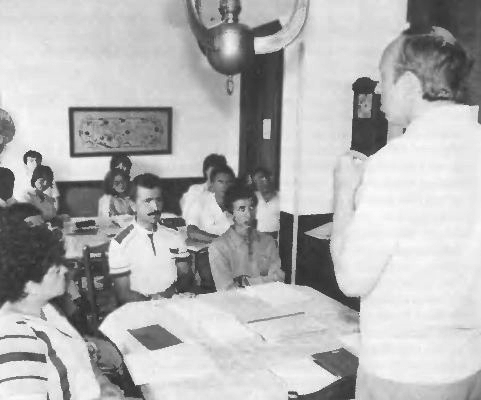
Thomas
Cromwell, leader of the Middle East region, speaks at the workshop.
Symbolic though it may have been, the restoration of that garden had a close relationship with the guidance we were receiving about the restoration of our own cosmos. This spot, because or the use to which we were putting it, was holy. God's presence was everywhere -- in our prayers, in our fellowship, and now in our joint efforts to restore the creation as well. As we dripped with sweat, nursed the garden of blisters sprouting on our hands, and battled with persistent horseflies, we felt the special joy that comes from being totally involved in God's creation. We were carving on that couple of acres a small symbolic garden, while deep inside was the desire to make the entire Middle East into a garden for True Parents.
While brothers were toiling in the garden, sisters were lovingly at work in the kitchen, preparing remarkable meals in view of the circumstances. Some of them helped out in the garden as well, pulling rakes or hauling wood alongside the brothers. As time came for the evening lecture, we would hang up out tools and head for the showers to find -- no water! Yes, there was a water shortage at Pelion, and every morning and afternoon the supply was cut off. So we relaxed over coffee, cookies, and watermelon, and when the water finally did come, since the time was short, we revived the old tradition of three-minute showers.
Of course the sea is also God's creation, and we didn't neglect to love it a couple of times, too. Not going out that often made our visits all the more special. And the seaside has more to offer than just a refreshing swim. It is also, as Father has shown us, perhaps the best place on earth to meet with God. Our most precious times at the beach were during our night prayers there. Once, at the beginning of the second week, we filled up our two vans and made the long, winding, seven-kilometer odyssey. The swimmers and sunbathers had all retreated for the night, and the beach was still. Only Heavenly Father remained, waiting for us.
Everyone's experience that night was special and extremely personal, and we didn't feel it necessary to give testimony afterwards. Prayers seem deeper when you are out in nature, gazing at God's face reflected in the infinity of the night sky. After all, isn't the whole creation the prayer room of our Heavenly Father?
Often just being together with brothers and sisters provided the greatest spiritual renewal. The brothers and sisters from Lebanon are faced daily with war, terror, and the irascible resentments of their country's people, and yet their love for True Parents, deep insights into the Principle, and cheerful attitude of faith enlightened us all. The brother representing Israel was a brilliant example of blazing righteous faith and endurance that inspired the love of God and drew Him to lead his forefathers out of bondage. And the Greek brothers and sisters, as always, were a model of loving service in their efforts to make everything go smoothly and comfortably for everyone. It was easy to see why the Greek family is now being blessed with so many victories.
Then there were the nights in the garden.... At the edge of the yard, overlooking the sea stands a single tree. Every night before turning in, as we felt individually moved to do so, we went to that tree to offer the day to Heavenly Father and make our commitments for the next day. The area around that tree took on the nature of a holy ground for us. We lingered there under the stars, in groups of twos or threes, sharing our feelings and learning again to find the purest and most beautiful expression of God within our brothers and sisters. In these circumstances, deep and profound truths are somehow revealed, mingled with soft laughter.
All too soon our 21 days together were drawing to a close. Nothing could be more appropriate than to go to the beach once more for one final meeting with Heavenly Father. And He was waiting. For these three weeks He had been encouraging us, revealing our weak points to us lovingly, and showing us solutions. And He had been strengthening our bonds of heart with True Parents and with each other. And now, on the beach, there was a tangible feeling of His embrace, His warmth. We felt that our offering had been accepted and He was sending us back to our countries with new hope and blessing: "Whatever is past is past. Go out now and do My will, and I will be with you:'
On our final day we took the 200-kilometer journey to the 13th-century Grand Mateora Monasteries, perched high on a jagged peak, once accessible only by basket and rope. Generations of Orthodox monks and nuns have sought communion with God in the solitude and isolation of these austere yet lovely windswept perches. It was a fitting place to close our workshop, for the time we had spent together had the mystic quality of a monastic retreat. Yet our purpose was to use our revitalizing experience with God as an impetus to return to real life with a new vision and fire.
In Sufism, or Islamic mysticism, there is a tradition of periodic spiritual retreat, called a chilla, which is seen as natural and necessary for the growth of the spirit. The chilla is a structured and disciplined yet unpressured environment, where the primary duty of the devotee is to concentrate on reaching a new level of experience with his Creator and through it receive more energy and vision to return to the world. Our experience in Greece showed us that, especially for the older members, this chilla type of workshop was very beneficial.
Our final night was spent in traditional family fellowship. Everyone made some kind of offering -- a song, a poem, a few words. It was a special night, sealed by our love for each other in True Parents. We closed early to prepare for an early departure the following morning.
The sun rose a little sadly the day we left Tsangarada. We carried everything to the van and lingered over our goodbyes. As Thomas said, there was almost no chance we could ever be together again in exactly the same way. This was a special gathering, a historical one, marked by its newness and spontaneity. It would never be quite the same again. We felt in our hearts that we represented all the brothers and sisters in the region who could not be there. As we pulled away, catching our last glimpse of the heavenly dwelling where we had been together, we saw by the road old deaf Photas beaming brightly and casting flower petals after us.
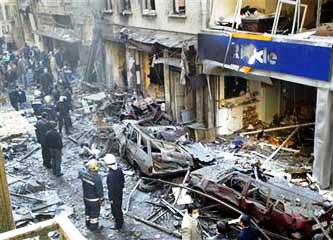
Neve
Shalom Synagogue in Istanbul -- September 6, 1986
Written September 6, 1986, between 9:00 and 9:30 a.m., as 19 innocent worshipers were being slain by terrorists at Neve Shalom Synagogue in Istanbul.
Their souls are seared and branded
with hell's own flames,
Their faces masked in blackness, none can
know their names.
Bitterness has warped them. Naught of love
remains,
No joy, no virtue, nothing left but raging pain.
In
their eyes no light, but yet a murderous glint
Reveals the hatred
driving them in their intent.
Men of faith would suffer, place their
hope in God,
And have lit the centuries with tears and blood:
Not
tears and blood of others, but their precious own,
And love and
truth in blossoms from their tears have grown.
And yet this generation chose the way
of fire.
The "god" they chose to lead them is a raging
liar,
And every blameless soul they've wasted in their rage
Is
one more screaming witness to a shameless age.
Certainly these
unshaved brutes will hear the cries
Of all their martyred victims
on the day they die,
And truly will they echo on through endless
years
Until they have restored their crimes with seas of tears.
This poem was written under unusual circumstances. I was at the Istanbul Airport, waiting for the arrival of Greek participants in the Greco-Turkish Dialogue we were convening in Istanbul the first weekend in September. I had arrived early and was sitting in the coffee shop. Suddenly I was overcome by a great anger and resentment towards terrorism and terrorists. I don't know exactly where it came from, but great sorrow just grabbed me. In our region we're always living close to terrorism and it's never far from our minds, but this was something different. It was really powerful, and I felt moved to put down on paper the feelings I was having. This poem emerged in the span of 20 minutes.
That night I learned from my wife that at exactly the time I was at the airport and these feelings were engulfing me, 19 Jewish worshipers were being murdered by Arab terrorists at the Neve Shalom Synagogue in Istanbul. Two Arabs had entered the Sabbath morning service, locked the doors, and began spraying everyone there with machine gun fire. The terrorists then blew themselves up with explosives when the police cornered them while trying to escape. In all, 21 lives were wasted. That night I had difficulty sleeping. The participants in our conference were greatly saddened.
I believe that I received the contents of the poem spiritually, both as the offense and anger of Heaven at this inhuman brutality and the pain and horror of the innocent people murdered in God's house while at prayer. How can such people as these terrorists ever restore themselves? God's love is deep enough to encompass even them, yet their indemnity must be terrible to bear.